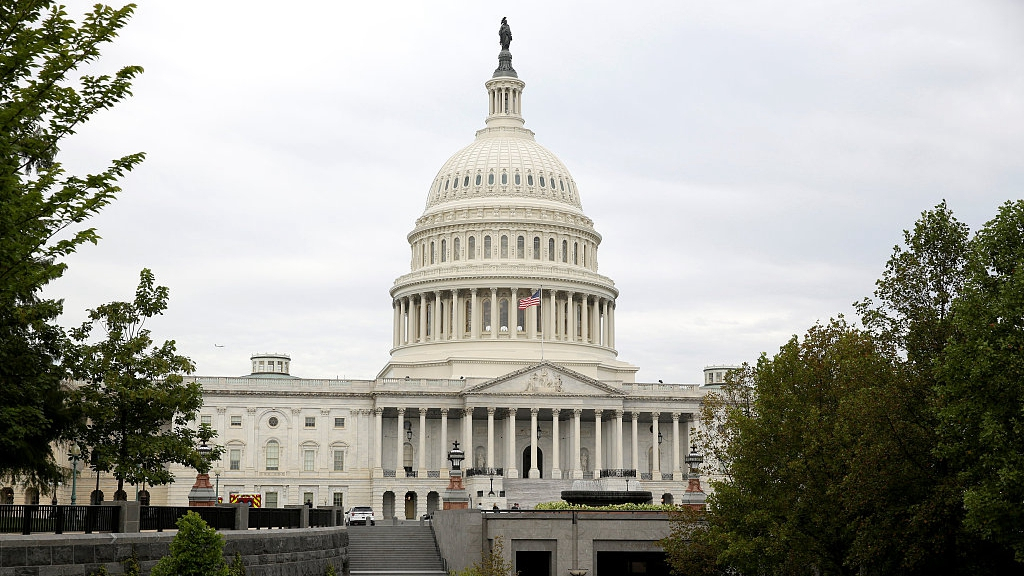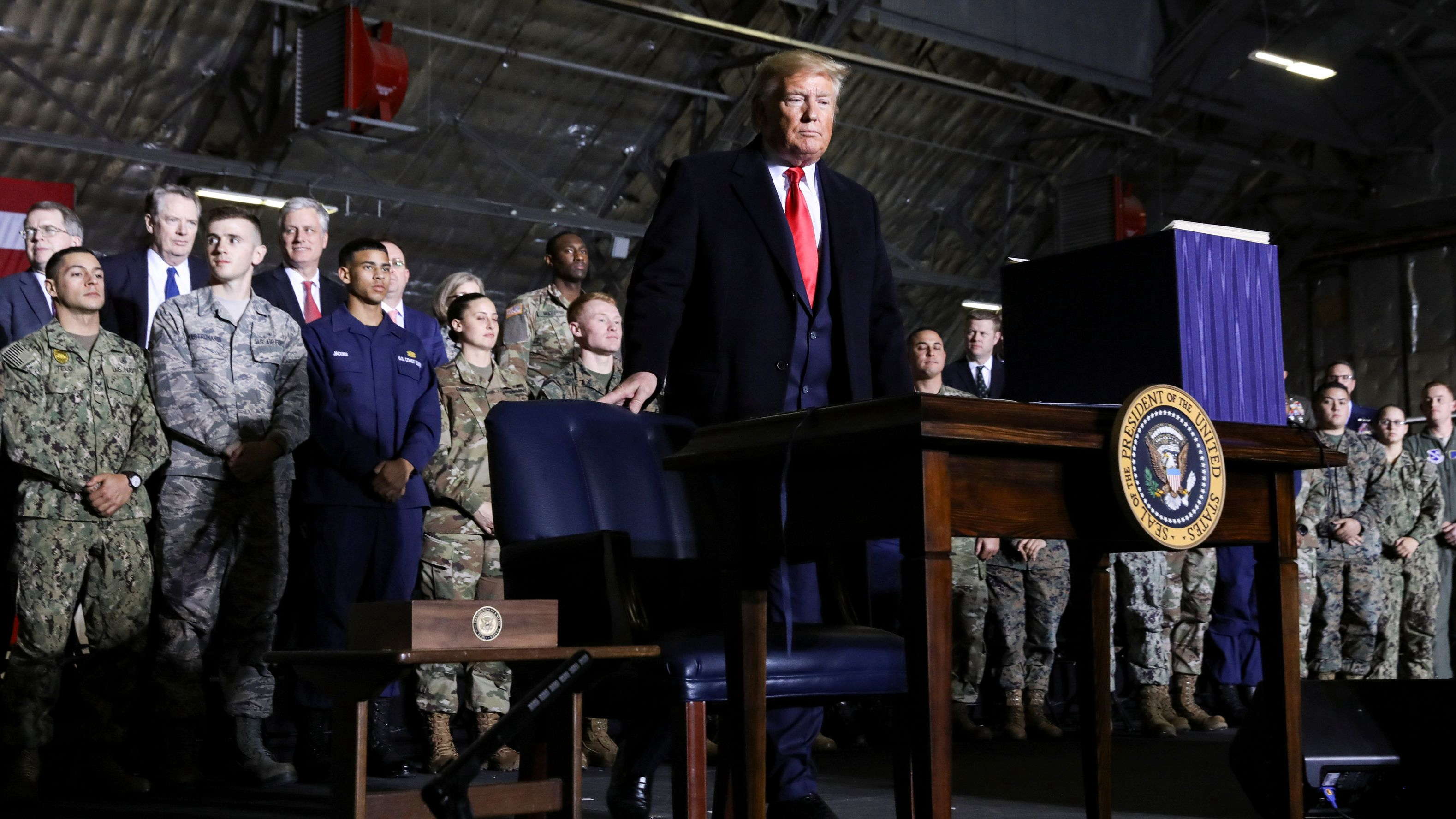
Editor's Note: Tom Fowdy graduated from Oxford University's China Studies Program and majored in politics at Durham University. He writes about international relations focusing on China and the Democratic People's Republic of Korea. The article reflects the author's opinions and not necessarily the views of CGTN.
U.S. President Donald Trump completed the signing of the annual National Defense Authorization Act (NDAA) on Friday, an annual mega budget defense bill, which sets out many of the most crucial aspects of U.S. military, security and other foreign policy matters.
Inevitably, the bill contained a number of anti-China provisions, including banning federal subsidies for Chinese manufactured transport rolling stock, banning the purchase of Chinese drones in the military, further stipulations of de-listing Huawei from the commerce department entity list, increased provisions for Taiwan, Hong Kong, Xinjiang, and the list goes on.
The mega bill comes despite Trump having recently agreed to a phase one trade agreement with Beijing. However, the bill is strictly bipartisan in nature and an annual must pass, meaning the President really had no options to object to it.
Given that this is the latest in a growing number of bipartisan China-targeted bills, which have come the President's way, engineered largely by hawkish congressmen, it is a sign of the times. The anti-China push in Washington is therefore a new normal, which exceeds far beyond the President.
Trump has unleashed forces he can no longer control, and this is going to pose grave long-term consequences for the relationship between the U.S. and China, which is likely to exceed the scope of his presidency. Efforts must be made to stabilize the relationship, secure a phase two agreement and push the congressional hawks back into the margins before they can do more damage.
A year ago when Trump commenced his tariff fight against China, he permanently changed the status quo in Washington by unleashing forces that were previously locked on the fringes of foreign policy debate. The U.S.-China relationship had been previously stable, yet the President's actions removed a long held taboo and gave political capital to those who had wanted to assault and confront Beijing for a long time, leading to a snowballing of mass hysteria and has seen a dramatic change in public sentiment.

U.S. President Donald Trump gets ready to sign the "National Defense Authorization Act for Fiscal Year 2020" at Joint Base Andrews, Maryland, U.S., December 20, 2019. /Reuters Photo
U.S. President Donald Trump gets ready to sign the "National Defense Authorization Act for Fiscal Year 2020" at Joint Base Andrews, Maryland, U.S., December 20, 2019. /Reuters Photo
The likes of Marco Rubio had been long moaning about China, yet even in a Republican-held Senate he held little sway before 2018. Yet the environment Trump has created has now placed individuals like Rubio on the forefront shaping America's relationship with China.
The results are disastrous. Looking at Rubio's sponsored bills on the official Congress site finds that he has proposed over 20 anti-China pieces of legislation since September, targeting literally everything. The number is staggering and whilst many do not get anywhere, some of them have done so as he has repeatedly found allies within the Democrat Party to support him.
In this case, Trump has effectively lost control of some aspects of U.S.-China relations. As the President, he cannot control Congress and especially not a bipartisan one, which makes it impossible to veto the bills coming his way. On Hong Kong, he had no choice, and nor did he on the NDAA which has effectively become a vehicle for such hawks to include as many anti-China provisions as possible, also the case in 2018. Thus, the new Cold War mindset has in effect become a new normal in Washington and something which is likely to exceed Trump's tenure as President.
But what can be done about it? This is nevertheless a period whereby Trump, on a personal and political level, is looking for increased stability in ties with China despite the increased attacks from Congress. The announcement of the phase one trade deal is meaningful progress, which may put a ceiling on things for the short term.
However, it is not enough. Rather than pursued escalation, efforts must be put towards securing a phase two deal before the 2020 election. If Trump can feasibly claim progress, this can restrain, albeit not stop, Republicans in their agenda. Ultimately, re-establishing a public narrative that China ties are beneficial to the United States is going to be what makes a positive difference. A great deal of the anti-Beijing political capital stems from the nonsense discourses that the administration has distributed. Pushing for more agreements with the United States can certainly pacify some of this, although it will still not solve everything.
Therefore, as a whole, the environment which U.S.-China ties are operating in is facing greater headwinds. Trump might be more willing to negotiate with Beijing and settle his own disputes. However, the consequences of his actions have now created a hostile and hysterical environment, leading him to have no control over an increasingly hawkish and bipartisan Congress determined to attack China at every angle. As 2020 approaches, all emphasis must be placed on stability and resolution to save the likes of Marco Rubio from pushing things to a point of no-return.
(If you want to contribute and have specific expertise, please contact us at opinions@cgtn.com.)